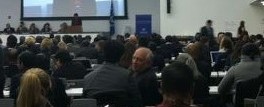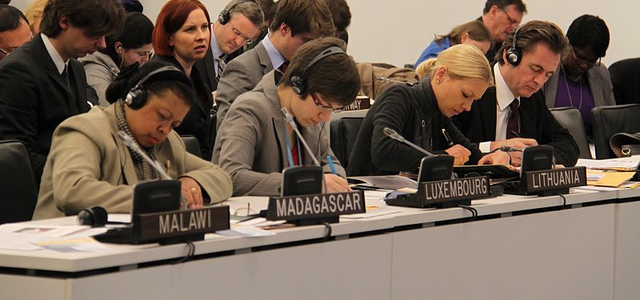 I am very thankful to Tony for giving me this opportunity to express some thoughts on the recent judicial elections at the 10th session of the ICC Assembly of States Parties. I must first note that as the election took place at the United Nations in New York, Tony was sitting in Washington, DC and I was sitting across the great pond in Germany. Nonetheless, at times Tony and me tweeted seconds after the other and, more importantly, seconds after the results came in. Although the technological development leading to this being possible is taken for granted nowadays, it still sometimes makes me say “wow.” — Eike Biehler
I am very thankful to Tony for giving me this opportunity to express some thoughts on the recent judicial elections at the 10th session of the ICC Assembly of States Parties. I must first note that as the election took place at the United Nations in New York, Tony was sitting in Washington, DC and I was sitting across the great pond in Germany. Nonetheless, at times Tony and me tweeted seconds after the other and, more importantly, seconds after the results came in. Although the technological development leading to this being possible is taken for granted nowadays, it still sometimes makes me say “wow.” — Eike Biehler
Elections for ICC judges are slightly complicated as there are requirements to have a good balance among judges experienced in criminal law (after all, the ICC is a criminal court) and ones experienced in international law (the ICC is an international court). Additional rules work to ensure that–whenever possible–both men and women, and all regional groups in the United Nations system are represented.
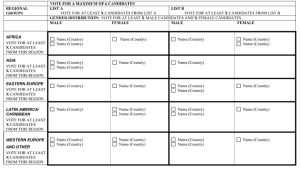
These minimum voting requirements, or MVRs, called for the election of at least 3 judges with experience in criminal law, one from the Asian regional group, one from Eastern Europe and 2 elected from the Latin American and Caribbean states. On the gender criteria, states were obligated by the voting requirements to elect least two male judges.
The minimum voting requirement for the Asian judge was changed after the nomination period began because the Statute came into force for Philippines and the Maldives, two Asian states, on 1 November and 1 December 2011, respectively. This increased the number of Asian states parties to 17 which is the threshold for a third judge. That looked a bit like changing the rules of the game while playing.
These minimum voting requirements provided that on the first ballot, the six candidates for whom states voted (as six seats were to be filled), had to include among them 3 judges with experience in criminal law, one Asian, one Eastern European, 2 from Latin American/Caribbean states, and 2 men. If a state’s vote did not reflect these choices, its ballot was marked invalid and discarded.
The MVRs themselves required a number of related minimum nomination requirements, which Mariana Rodriuez-Pareja covered in her earlier post. One would have expected from these minimum requirements that there would be many qualifying candidates. At least two male candidates had to be nominated, and 2 elected; of the 19 final candidates, 17 were male. One would have similarly anticipated that a large number of candidates would be Eastern European or Asian states (at least one from each had to be elected), but surprisingly, these groups barely managed to meet the minimum nominating requirements.
In the end, there were 16 nominees with experience in criminal law and three with experience in international law; eight Africans (although they had no minimum voting requirement in their favor), two Asian, two Eastern European, five Latin American/Caribbean and two Western European nominees. Of the 19 nominees, 17 were male and 2 female.
The Coalition for the International Criminal Court (CICC), an NGO which seeks to strengthen the ICC, asked a panel of experts in international criminal law to assess the candidates. While the panel did not make rank or endorse any of the candidates, it found four of the 19 “not qualified” for election in their respective list (experience in criminal or international law). Two such “not qualified” candidates were nominated from Latin America, one from Asia and one from Africa. Whether or not this contributed to his decision, the African “not qualified” candidate, Ajmi Bel Haj Hamouda, withdrew his candidacy some days before the States Parties convened, leaving 18 candidates for consideration.
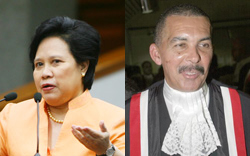
Miriam Defensor-Santiago from the Philippines received the required two-third majority of valid votes in the first ballot on 12 December. As the sole Asian candidate assessed as “qualified,” this is not surprising. With her, Anthony Carmona from Trinidad and Tobago squeezed in. The minimum voting requirements were adjusted accordingly for the second round: With Defensor-Santiago’s election, the MVR for at least one Asian candidate being elected was fulfilled. She was also a candidate with experience in criminal law, so that MVR was reduced to two. The remaining MVRs included election of one Eastern European, one Latin American/Caribbean and one male.
The candidates considered “not qualified” by the independent panel fared well, with average number of votes only slightly less than “qualified” candidates. On the other hand, African candidates all scored below average in the first round, and three of the seven dropped out afterwards.

On the second ballot, held on 13 December, Robert Fremr from the Czech Republic increased his strong showing from round one and was elected, filling the required Eastern European seat on the bench. His support in the first round and the election of Defensor-Santiago weakened support for the only other Eastern European and Asian candidates. Vote counts for other candidates did not change significantly. Before the third round, the Asian candidate George A. Serghides, one of the remaining “not qualified” candidates, withdrew having lost over 20 votes between the first and second ballots. African candidate Modeste-Martineau Bria, picking up only 1 additional vote despite the exit of three regional competitors, also withdrew his candidacy.
Another three ballots were taken on 13 December with no additional judges being elected. Howard Morrison of the United Kingdom was the frontrunner, securing up to 67 votes, 11 shy of the necessary two-thirds majority. He was followed by Chile Eboe-Osuji of Nigerian and Bruno Cathala from France with 51 votes each in the 5th round. Several Latin American/Caribbean candidates and an African fought against each other with only slight growth in support. By the end of the day, Mindua of the DRC, pulled out.
By the end of the second day of voting (which had been scheduled to be the last day of voting), there were still eight candidates in contention for three seats: two from Western European, two from Africa and four from Latin America and the Caribbean, among them the two remaining “not qualified” candidates. In retrospect, it had become clear by then that the three remaining seats would be occupied by an African, a Latin American and a Western European. The question was who from each regional group would win the seats informally allotted to each.
As the 5th round, the race was no longer restricted by the minimum voting requirements. The rules include a mechanism to facilitate an apparent deadlock: If after four ballots not all gender and regional minimum voting requirements are fulfilled, they are simply abandoned. Only the requirement for criminal law experience (List A) is continued. As only two of those candidates still in contention were List B nominees, the voting requirement was moot given the need to fill three seats. However, it could have affected further voting, as once all this requirement was met, further rounds of voting would have become elimination rounds. As long as there continued twice the number of candidates as available seats, the lowest scoring candidate(s) in further successive rounds would be eliminated from consideration.
Voting resumed on 14 December, but the three ballots proved inconclusive. By the end of the day, almost nothing had changed significantly in the vote totals. The remaining Eastern European,Władysław Czapliński, and Eduard Cifuentes Muñoz from Latin American withdrew, to be followed the following day by Javier Laynez Potisek, also from Latin American and one of the two remaining “not qualified” candidates. This left two Western Europeans, two Africans and two Latin Americans in the game.
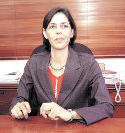
The next day, 15 December, turned out to be the decisive but not yet the final day of voting. While the first two ballots of the day, the 9th and 10th, saw minimal changes in voting tallies, Potisek’s withdrawal fundamentally changed the dynamics of the election. Olga Venecia Herrera Carbuccia from the Dominican Republic became the frontrunner, missing the threshold in the 11th ballot by only two votes. The 12th ballot finally broke the deadlock. Herrara Carbuccia was elected, and there remained two seats and two candidates each from Western Europe and Africa. Each region had one clear leader in terms of support.

The final day of voting was 16 December. In the 13th ballot, Howard Morrison of the United Kingdom was elected with 72 votes. It was pretty clear that the last remaining seat would go the African Chile Eboe-Osuji from Nigeria who had almost three times the votes of his regional opponent, Vinod Boolell of Mauritius. Boolell dropped out before the 14th ballot, yet Eboe-Osuji still missed the threshold by a handful of votes. He was still far ahead of France’s Cathala, his only competitor. Cathala eventually stepped aside, conceding the seat to Eboe-Osuji. The rules required a candidate to receive 2/3 majority support, so a 15th ballot was required despite Eboe-Osuji being the sole candidate.
This was the second-longest election since the inaugural election in 2003 when the Assembly of States Parties needed 33 ballots for 18 judges. One Asian, two Latin American, one Eastern European, one Western European and one African candidate were elected and will assume office on 11 March 2012. Are these the most qualified judges? I don’t know because I cannot at all say why one candidate should be considered better than another one. What I can say and what lets me believe in the wisdom of the electorate is that all four nominees who were assessed as “not qualified” by the CICC panel had to withdraw during the ballots due to the lack of votes received.

